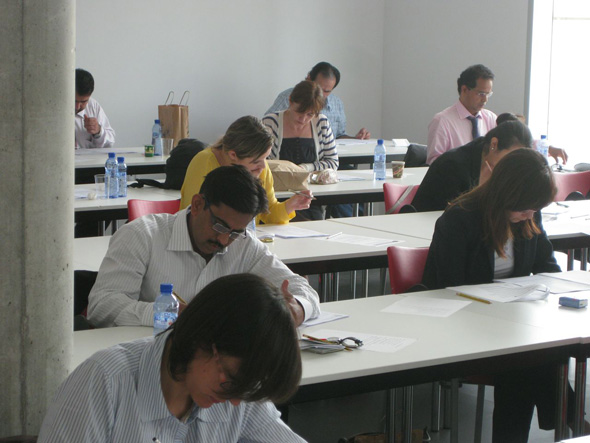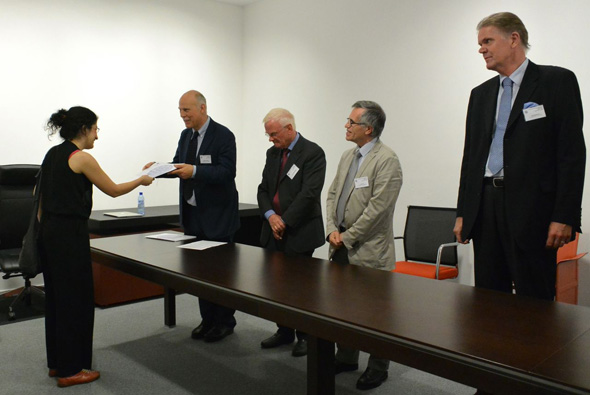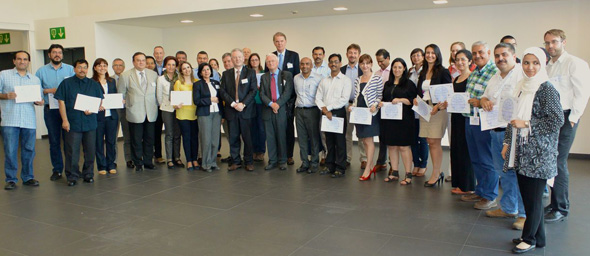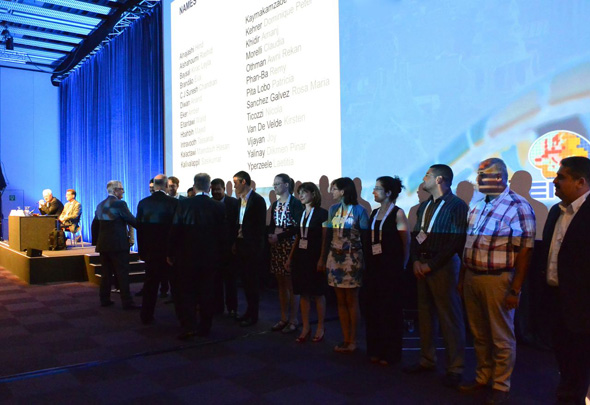Report of the 5th Examination of the European Board of Neurology
The European Board examination in Neurology took place during the ENS congress in Barcelona on June 7th, 2013. 29 candidates attended the examination. These were from Europe (Belgium, Cyprus, Germany, Italy, Portugal, Spain, and Turkey) and from outside Europe (Canada, India, Iraq, Jordan, Saudi Arabia, Singapore, South Africa, and United Arab Emirates). For the first time candidates from outside Europe were accepted.
The examination has been a joint development of the UEMS/EBN with the ENS and EFNS with the contribution of questions by the MDS (Movement Disorder Society), the ESO (European Stroke Organisation) and several other societies and individuals. Also e-Brain donated questions were adapted and used in the question pool.
25 candidates passed the examination and became either fellows of the UEMS/EBN or they received a diploma of the UEMS/EBN. This distinction is necessary, as all European candidates have a locally certified clinical training in an EU/EEA country and Turkey, whereas the other candidates do not have this training.
The pattern and methodology of the UEMS/EBN examination until 2012 consisted of 120 MCQs (Multiple Choice Questions) and an oral examination, and also a voluntary case presentation. All the questions that were used went through a rigorous quality assessment by the education committee, the Department of Medical Education of the Ege University in Turkey (Prof. Caliskan), and a final editing by the examination committee. The 120 MCQs were also distributed according to topics.
This year was of particular importance since the UEMS EBN decided to set up a new procedure for assuring more objective results and making a new standard for our society. This time the oral examination was replaced in 2013 by EMQs (Extended Matching Questions), which are case scenarios with 8-20 possible correct answers. The EMQ test in addition to knowledge also evaluates clinical reasoning. The development of this new type of examination has been time consuming and could only be completed with the help of several individuals, which are mentioned on the website and who spent considerable effort in this task.
In addition to the described steps of quality assessment since 2012 for each part of the examination, the MCQ and EMQ, a passing limit, based on the Nedelsky (MCQ) and the Angoff (EMQ) method was introduced. This time 10 neurologists met a day prior to the examination and under the supervision of Prof. Caliskan went through the questions to calculate and define the passing limit.
The oral presentations have now become a mandatory part of the examination. The candidates have to present a case of their choice and can thus obtain some extra points for this presentation, being judged by two examiners according to a scheme.
Based on the experience of the previous examinations, a suitable surrounding, staff, and also a system of electronic evaluation were available, which made the results available and final shortly after the end of MCQ and EMQ.
The successful participants were finally awarded the title “Fellow of the UEMS/EBN” (European candidates), or they received the Diploma of the UEMS/EBN. The ENS honored the candidates by introducing them to the audience before the ENS presidential symposium, and they were congratulated by the president of the ENS, the president of the UEMS/EBN and the chair of the examination committee.
Internationally the UEMS/EBN examination is presently considered as equal to the national examination by Austria and Belgium, and it is hoped that like in other sections of the UEMS, the examination will either partly or as a whole replace the national examinations.
The process of the examination, the list of topics and examples for MCQs and EMQs are presented at the UEMS/EBN website.
The UEMS/EBN examination in 2014 will take place in Istanbul, at the joint congress of the ENS and EFNS. Both these societies, which will soon merge and form the EAN (European Academy of Neurology), have contributed in many ways by supporting the European Board Examination by hosting the examination, delivering questions from their scientific panels and also supporting its development, which originally was funded by the European Board of Neurology.
At work
The receipt of diplomas
A final image
ENS presidential symposium
